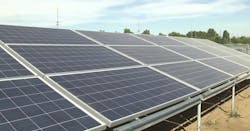Second solar farm planned for University of Illinois at Urbana-Champaign
The University of Illinois at Urban-Champaign is planning to establish a second solar farm that officials say will put it in the lead among American universities in terms of solar energy.
The Champaign News-Gazette reports that plans are moving ahead for a 55-acre solar farm in Savoy, Ill., about a mile south of the first 21-acre farm.
Physics Professor Scott Willenbrock, who recently served as a provost's fellow for sustainability, says the farm will help the campus meet its goal of generating 5 percent of its energy needs from renewable sources. That target was part of the Illinois Climate Action Plan, known as iCap.
The goal is to generate 25,000 megawatt hours of energy per year through solar generation; the existing solar farm, built in 2015, provides about 7,000 megawatt hours a year, or roughly 2 percent of the campus energy use.
By generating more of its own power, the campus can buy less off the grid, which reduces its carbon footprint. About 50 percent of that external power comes from coal and 25 percent from natural gas, Willenbrock says.
Given the dire warnings in the recent U.S. climate assessment by 13 federal agencies — which warned of huge damage to the American economy if trends aren't reversed — the development of solar energy is more important than ever, Willenbrock says.
Provost Andreas Cangellaris says the iCap was carefully developed to reduce the UI's carbon footprint.
"We are in a position to really move forward with totally renewable energy reliance," he says. "This is not uniformly possible today, but we have a responsibility to do that."
Others had questions Monday about the cost of the solar farm or the longevity of the technology. Willenbrock said it will have improved solar panels, "cheaper and better" than those used in the first one.
The university is putting out a request for proposals for a power-purchase agreement. As with the first solar farm, private companies will bid to build it and then sell the energy to the university. The university would have to pay no money up front, but would pledge to buy the electricity at a fixed rate over a 10- or 20-year period, then purchase and operate the solar farm.
About the Author
Mike Kennedy
Senior Editor
Mike Kennedy, senior editor, has written for AS&U on a wide range of educational issues since 1999.
